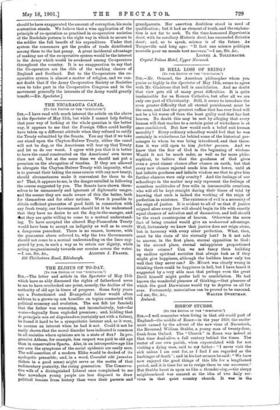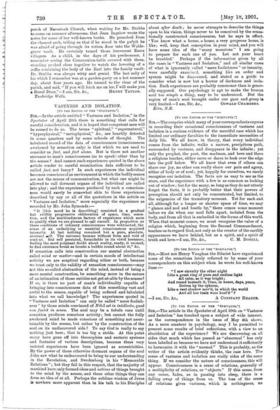BISHOP STUBBS.
[TO THE EDITOR OF THE "SPECTATOR.") well remember when living in that old-world part of England—the middle of Essex—in the year 1850, the excite- ment caused by the advent of the new vicar of Navestock, the Reverend William Stubbs, a young man of twenty-four, fresh from Oxford. The " Church " in Essex was indeed at that time dead-alive, a full century behind the times. The rector of our own parish, when expostulated with for not visiting a dying man, said to my father : "I never visit the sick unless I am sent for, as I find I am regarded as the harbinger of death"; and in his last sermon be said: "We have now enjoyed the good things of this life for a lengthened period, and it is time for us to resign them to our successor:, But Stubbs burst in upon us like a thunder-clar,—the sleepy neighbourhood was amazed at the idea of two daily ser- vices in that quiet country church. It was in the porch of Navestock Church, when waiting for Mr. Stubbs to come on summer afternoons, that Jean Ingelow wrote the notes for some of her well-known books. He preached from the chancel arch, telling us that if he stood in the pulpit he was afraid of going through its rotten floor into the Walde- grave vault. He certainly tamed those irreverent Essex villagers. As a child, in the days of his predecessor, I remember seeing the Communion-table covered with them, standing packed close together to watch the lowering of a zoffin containing the body of the Earl into the family vault. Dr. Stubbs was always witty and genial. The last sally of his which Lremember was at a garden-party on a hot summer day, about four years ago. He turned to the vicar of the parish, and said, "If you will fetch me an ice, r will make you a Rural Dean."—I am, Sir, &c., HENRY TAYLOR. Tunbridge Wells.







































 Previous page
Previous page